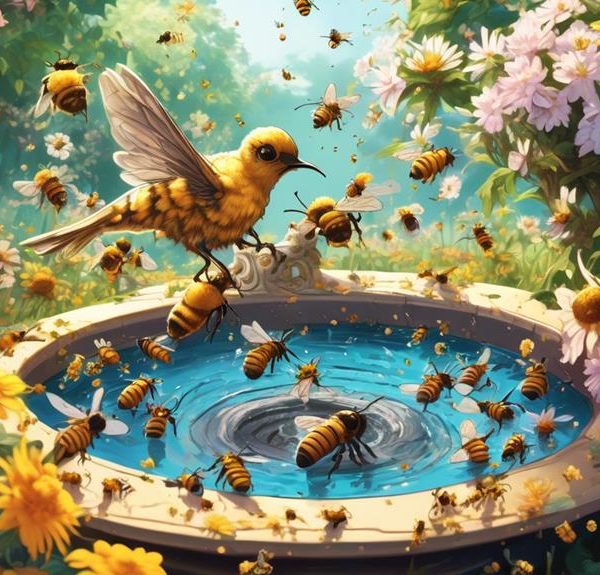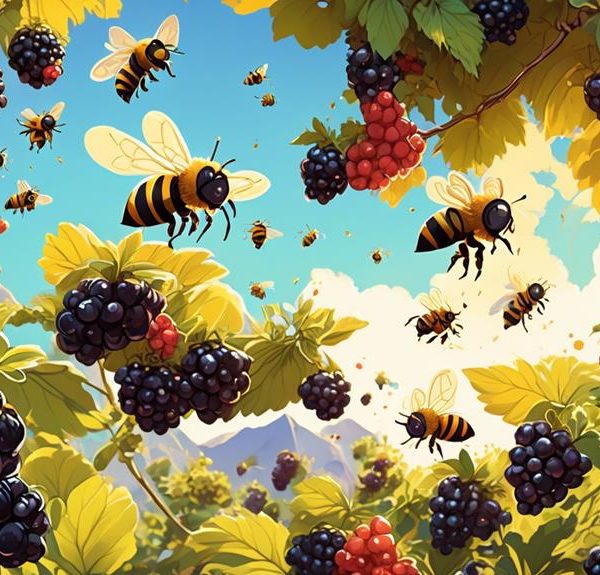Bees and black cherries share a complex relationship, discover the intriguing dynamics governing their interactions in nature's grand ballet.
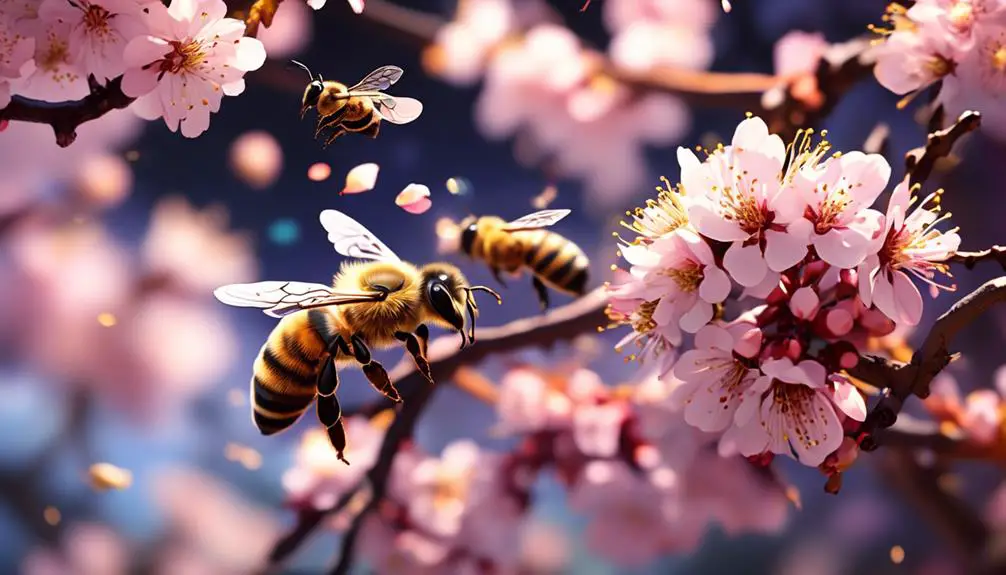
Do Bees Like Black Cherry
Just as Winnie the Pooh is drawn to his pot of honey, you might be pondering whether our industrious little friends, the bees, are attracted to black cherries. The relationship between bees and black cherries isn't as straightforward as you might think.
It's not just about the sweet allure of nectar. There are various factors at play, including the bees' innate preference, the nutritional value of the fruit, and the role of bees in pollination.
As we explore this topic, you'll discover more about the intricate interplay between bees and black cherries, which may leave you with a newfound appreciation for the complex dynamics of nature.
Key Takeaways
- Bees are attracted to black cherries due to the specific VOC profile emitted by the fruit and the visually appealing blossoms.
- Black cherries provide bees with abundant nectar and nutritious pollen, supporting their energy needs and larval development.
- Bees play a vital role in pollinating black cherry trees, leading to the development of fruit.
- Bees' pollination efforts significantly increase the yield and quality of black cherries, contributing to larger and sweeter fruits.
Understanding Bee's Attraction to Fruits
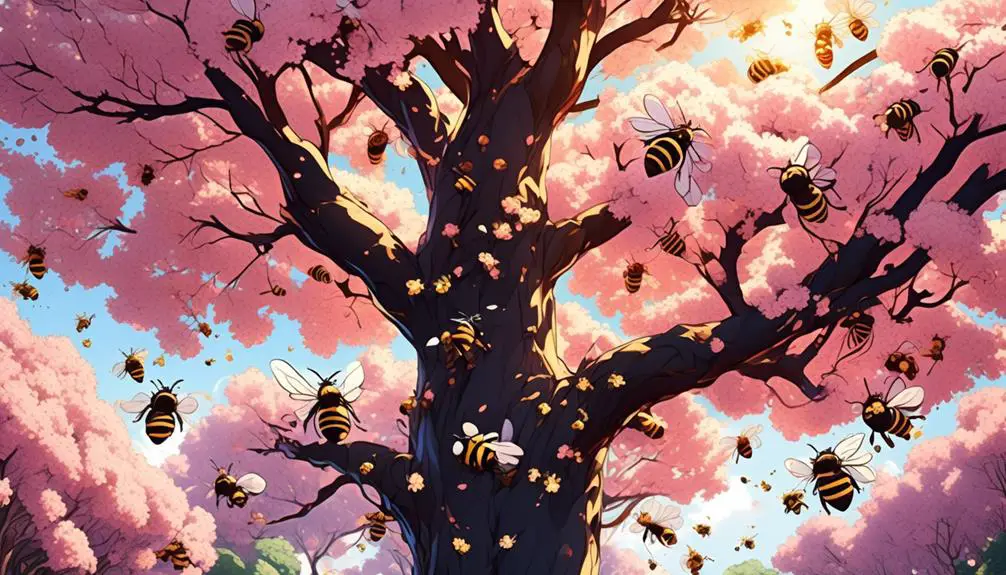
In exploring the intricate relationship between bees and fruits, it's crucial to delve into the specific factors that influence bees' attraction to certain fruits, such as black cherries. You see, it's not just a random preference.
Bees are lured by the aroma of fruits, which arises from a complex blend of volatile organic compounds (VOCs). These VOCs differ significantly among fruit species, leading to varying degrees of attractiveness to bees.
Now, regarding black cherries, they emit a specific VOC profile that's particularly enticing to bees. Each cherry blossom releases a unique concoction of scent molecules that's akin to a botanical perfume, designed to seduce bees. Not only that, but black cherries also offer rewarding nectar, a sugary liquid that serves as a prime energy source for bees.
But it's not all about the scent and nectar. Bees also have an innate preference for certain colors and shapes. Black cherry blossoms, with their vibrant pink petals and bell-like form, are visually appealing to bees.
The Role of Black Cherries in Bee's Diet
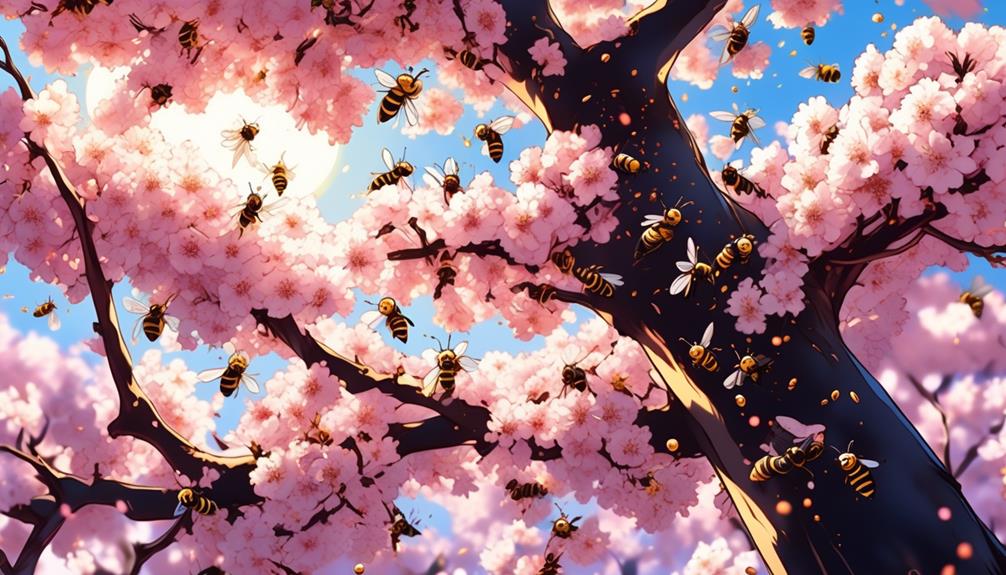
Surprisingly, black cherries play a substantial role in a bee's diet, offering not only an abundant source of nectar but also pollen rich in proteins and lipids essential for bee nutrition. These tiny insects are attracted to the sweet, sugary nectar, which serves as an energy source, while the protein-rich pollen aids in larval development.
Black cherries bloom in early spring, providing bees with a reliable early source of food. You'll notice bees buzzing around these trees as they forage for the vital nutrients they deliver, particularly when other food sources are scarce.
Furthermore, the black cherry's pollen has a unique composition. It's not just protein-rich, but also contains specific amino acids, vitamins, and minerals that contribute to bee health. Bees feeding on black cherry pollen exhibit improved resistance to diseases and parasites, which are significant threats to bee populations worldwide.
Importantly, black cherries also play a crucial role in the ecosystem. They're part of a mutualistic relationship where bees get nourishment, and in turn, the trees receive pollination, enhancing fruit production.
How Bees Pollinate Black Cherry Trees
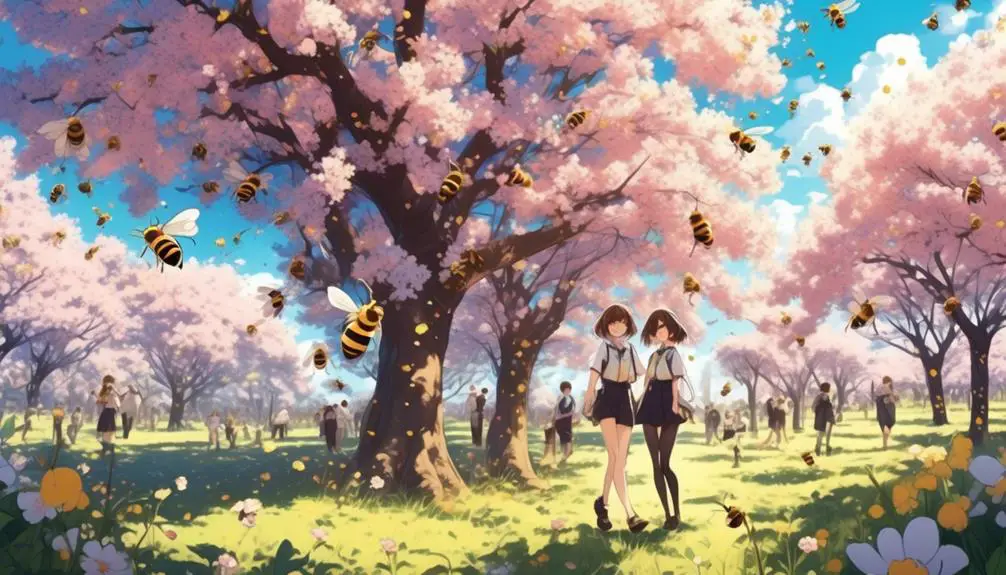
Now, let's explore the intriguing process by which bees pollinate black cherry trees, a crucial activity that underscores the symbiotic relationship we've just discussed. You see, honey bees play a vital role in the pollination of black cherry trees. They visit the flowers, seeking nectar and pollen. As they do so, they unwittingly transfer pollen from the male anthers to the female stigma, thus fertilizing the flower and paving the way for fruit development.
Here's a simple table illustrating this fascinating process:
Step | Bee Activity | Impact on Black Cherry Tree |
|---|---|---|
1 | Bee visits flower for nectar and pollen | Bee picks up pollen from anthers |
2 | Bee moves to another flower | Pollen from first flower comes into contact with stigma of second |
3 | Fertilization occurs | Leads to development of black cherry fruit |
This process not only ensures the propagation of black cherry trees but also provides the bees with necessary sustenance. It's a perfect example of nature's reciprocal relationships, where each party benefits from the other's activities. So, the next time you see a bee buzzing around a black cherry tree, you'll know exactly what it's up to.
Impact of Bees on Black Cherry Yield
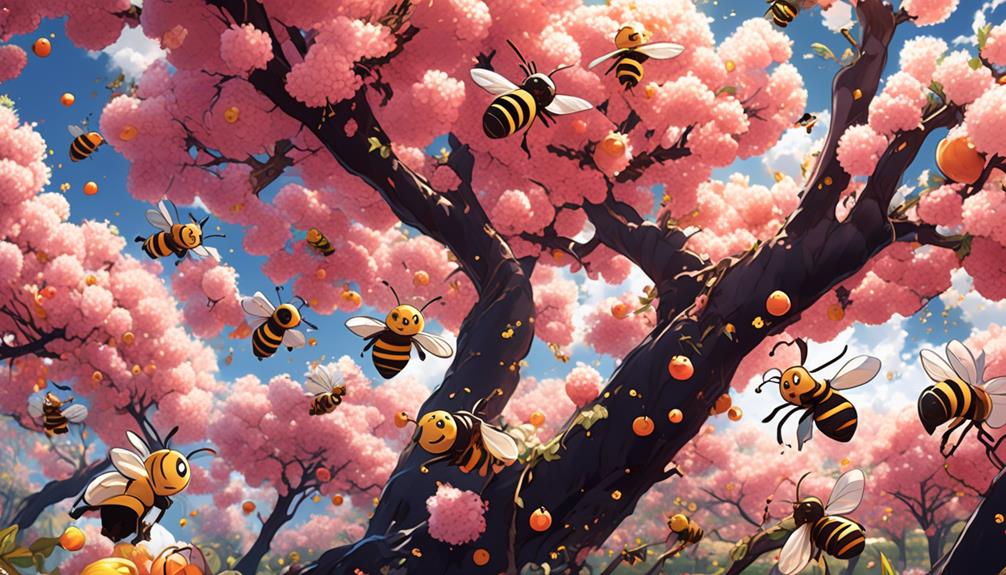
Consider the profound influence that bees exert on the yield of black cherry trees; their tireless pollination efforts significantly boost the production of this succulent fruit. Every time a bee visits a black cherry flower, it's not just seeking nectar. It's also unintentionally transferring pollen from the male parts of the flower to the female parts, enabling fertilization and fruit development.
Let's delve into the specifics. Scientific studies have shown that cross-pollination, which bees are instrumental in achieving, results in larger, healthier cherries. You see, black cherry trees are self-incompatible. That means they need pollen from a different tree to ensure successful fruit set.
Without this crucial intervention by bees, the yield of black cherry trees would diminish significantly. In essence, the more bees, the more pollination, and the higher the yield.
However, it's not just quantity. Bees also enhance quality. Pollinated cherries have been found to have greater sugar content, which means sweeter cherries for you and me. In this way, bees don't just increase the yield of black cherries, they enrich their quality, too.
Threats to Bee Population and Black Cherry Pollination
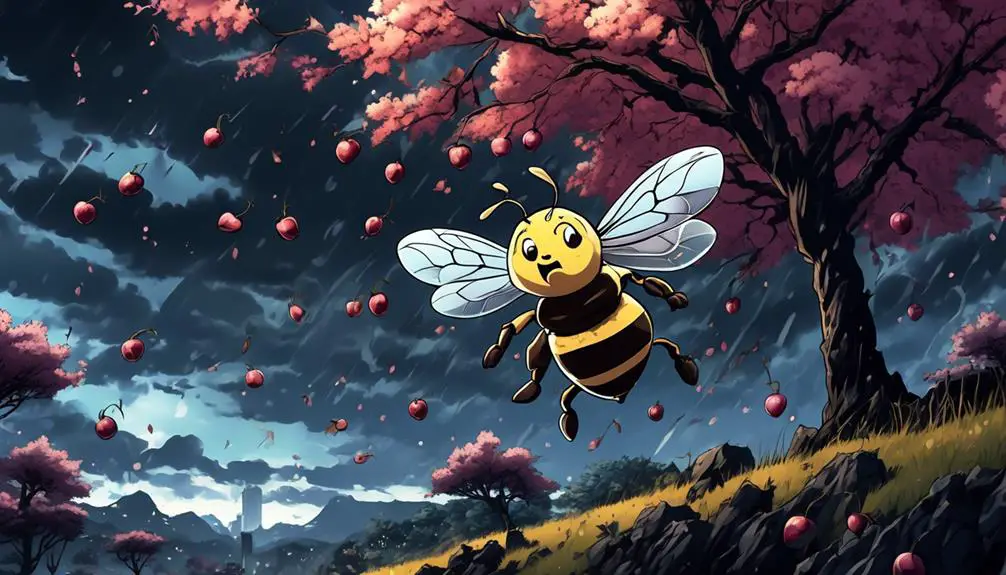
Despite the undeniable benefits bees bring to black cherry pollination, they're facing a range of threats that could severely impact their population and, consequently, the future of black cherry trees. It's crucial you understand these threats and their potential consequences.
Pesticides, habitat loss, diseases, and climate change are among the top threats bees face today. Pesticides, often used in agriculture, can be lethal to bees or affect their ability to forage and reproduce. Habitat loss, due to urbanization and intensive farming, leaves bees with fewer places to live and less food to eat.
Threats to Bees | Impact on Black Cherry Pollination |
|---|---|
Pesticides | Reduced bee population, decreased pollination |
Habitat Loss | Limited bee habitats, fewer pollinators |
Diseases | Weakened bee health, decreased pollination |
Climate Change | Shifted bloom times, mismatched bee activity |
Diseases can devastate bee colonies, reducing their numbers and pollination efficiency. Climate change may cause mismatch between bee activity and black cherry blooming period, disrupting pollination.
Being mindful of these threats, you have a critical role to play in mitigating these risks to ensure the continued pollination of black cherry trees by bees.
Encouraging Bees to Your Black Cherry Trees
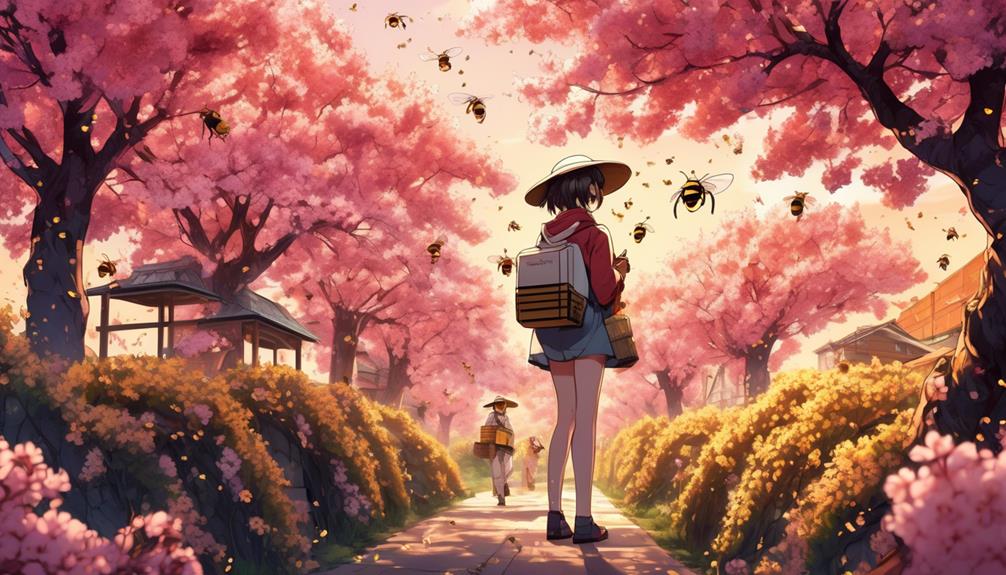
To attract bees to your black cherry trees and enhance pollination, there are several effective strategies you can implement.
Firstly, you can plant a variety of bee-friendly plants in the vicinity of your trees. Certain plants, such as lavender, sage, and sunflowers, are known for their attractiveness to bees. By planting these around your trees, you're creating a bee-friendly habitat that will encourage their arrival and, in turn, improve your tree's pollination.
Secondly, providing a fresh water source nearby can be beneficial. Bees need water for various physiological processes, including digestion and temperature regulation. A shallow birdbath with stones for them to land on will suffice.
Lastly, avoid using pesticides on your trees or nearby plants. Many common pesticides are harmful to bees, reducing their population and affecting their ability to pollinate. Opting for organic pest control methods instead will create a safer environment for bees.
Frequently Asked Questions
How Can Climate Change Affect the Relationship Between Bees and Black Cherry Trees?
Climate change can disrupt the balance between bees and trees. It might cause early blooming of black cherry trees, which bees might miss if they're not yet active. You'll find fewer bees pollinating the trees, leading to reduced fruit production.
Also, higher temperatures can stress bees, affecting their productivity.
What Are the Other Insects That Contribute to the Pollination of Black Cherry Trees Apart From Bees?
Apart from bees, several other insects aid in the pollination of black cherry trees. You'll often see butterflies, moths, and beetles buzzing around these trees, playing a vital role in their pollination.
Even certain bird species contribute to this process. However, it's important to remember that each species has its unique method and effectiveness, and environmental factors can significantly impact their role in pollination.
Can Bees Be Allergic to Black Cherry Pollen?
You're asking if bees can be allergic to black cherry pollen.
It's interesting, but insects like bees don't have immune responses like humans do. They don't develop allergies. Instead, certain substances can be toxic to them but it's not an allergy.
As for black cherry pollen specifically, there's no evidence to suggest it's harmful to bees.
How Does the Taste of Black Cherry Honey Differ From Other Types of Honey?
You're wondering how black cherry honey tastes compared to other honeys.
In general, black cherry honey has a deep, rich flavor with a hint of tartness. It's quite unique, contrasting with the light, floral notes found in clover honey or the robust, earthy tones of buckwheat honey.
Just like wine, each type of honey carries distinct flavors from the plants the bees visited.
Are There Any Specific Species of Bees That Prefer Black Cherry Trees Over Other Fruit Trees?
You're curious about certain bee species favoring black cherry trees over other fruit trees.
It's crucial to note that bees aren't picky. They don't typically favor one tree species over another. Instead, they're attracted to the most available, abundant, and accessible nectar and pollen sources, regardless of the tree type.
Conclusion
In conclusion, bees indeed fancy black cherries, playing a crucial role in their pollination and yield. However, threats to the bee population can adversely affect black cherry trees.
It's vital to create bee-friendly environments to boost their numbers. Remember, your efforts in encouraging bees to your black cherry trees won't only enhance your yield but also contribute to the overall bee population, integral for our ecosystem.

